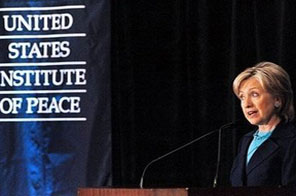US quest for nuclear- free world
WASHINGTON: The United States will never have "normal, sanctions-free relations" with a nuclear-armed North Korea, Secretary of State Hillary Clinton warned as she demanded its full atomic disarmament.
In a speech about the US quest for a nuclear-free world, Clinton tackled suspicions that North Korea intends only to use negotiations with the United States and other powers to become a recognized atomic weapons state.
The top US diplomat said President Barack Obama's administration remained open to one-on-one talks with North Korea within the context of six-party negotiations, suspended for the last six months.
North Korea, after a tense months-long showdown marked by an underground nuclear weapons test and a series of rocket launches, has recently signaled it wants direct talks with the United States.
"But North Korea's return to the negotiating table is not enough," Clinton told a gathering of foreign policy experts organized by the United States Institute of Peace, a think tank.
"Current sanctions will not be relaxed until Pyongyang takes verifiable, irreversible steps toward complete denuclearization," Clinton said.
"Its leaders should be under no illusion that the United States will ever have normal, sanctions-free relations with a nuclear-armed North Korea," she added.
Besides the United States, China, Russia, South Korea and Japan have taken part in the six-party talks, which North Korea quit in April after the United Nations censured it for a long-range rocket launch.
Clinton also repeated that the new administration's diplomatic engagement with Iran over its disputed nuclear program cannot be "open-ended."
Along with the four other permanent members of the UN Security Council Russia, China, France and Britain plus Germany, the Obama administration opened talks with Iran three weeks ago in a bid to halt Tehran's uranium enrichment program.
Iran rejects Western allegations that it aims to build a nuclear bomb, saying the program is for peaceful nuclear energy.
Clinton put Tehran and Pyongyang at the heart of Obama's worldwide quest to banish atomic arms that he revealed in Prague in April.
She called for bolstering the IAEA watchdog after saying it lacked "the tools or authority to carry out its mission effectively," citing its failure to detect Iran's covert uranium enrichment plant near Qom and Syria's alleged reactor.
In 2007, Israeli warplanes bombed Syria's alleged nuclear plant.
The IAEA, the International Atomic Energy Agency, should "be given new authorities, such as the ability to investigate nuclear weapons-related activities even when no nuclear materials are present," she said.
"And if we expect the IAEA to be a bulwark of the non-proliferation regime, we must also give it the resources necessary to do its job," the secretary said.
In a statement from its Washington embassy, Syria said it "is a signatory to the NPT (Non-Proliferation Treaty) and has abided by all its obligations under this treaty, regardless of the false accusations leveled by some circles."
Damascus urged the new administration to adopt a Syrian-sponsored UN resolution declaring the entire Middle East a region free of weapons of mass destruction, as well as to press US ally Israel to sign the NPT.
Under the treaty that took effect in 1970, nuclear powers are forbidden from transferring nuclear weapons or helping other states from acquiring them.
"Stopping terrorists from acquiring the ultimate weapon was not a central preoccupation when the NPT was negotiated," Clinton said. "But today, it is. And it must remain at the top of our national security priorities."
Clinton also said US negotiations with Russia for a successor to the 1991 Strategic Arms Reduction Treaty (START), which expires December 5, would enhance both US and world security.
The chief US diplomat also renewed the administration's commitment to obtain Congressional ratification of a Comprehensive Test Ban Treaty (CTBT).
Six countries -- the United States, Indonesia, Iran, Israel, China and Egypt -- have signed but not ratified the pact.
North Korea, India and Pakistan have not signed it and all three have carried out nuclear tests since 1996.






